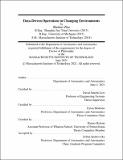| dc.contributor.advisor | Simchi-Levi, David | |
| dc.contributor.author | Zhu, Ruihao | |
| dc.date.accessioned | 2022-01-14T14:51:33Z | |
| dc.date.available | 2022-01-14T14:51:33Z | |
| dc.date.issued | 2021-06 | |
| dc.date.submitted | 2021-06-16T13:27:11.573Z | |
| dc.identifier.uri | https://hdl.handle.net/1721.1/139127 | |
| dc.description.abstract | Rapid development of data science technologies have enabled data-driven algorithms for many important operational problems. Existing data-driven solutions often requires the operational environments being stationary. However, recent examples have shown that the operational environments can change dynamically. It is thus imperative to design data-driven algorithms that is capable of working in time-varying environments.
We first introduce data-driven decision-making algorithms that achieve state-of-the-art dynamic regret bounds for non-stationary bandit and reinforcement learning settings. These settings capture applications such as advertisement allocation, dynamic pricing, and inventory control in changing environments. Our main contribution is a general algorithmic recipe for a wide variety of non-stationary bandit and reinforcement learning problems without any knowledge about the environments in advance.
Next, we study the problem of learning shared structure across a sequence of dynamic pricing experiments for related products. We consider a practical formulation where the unknown demand parameters for each product come from an unknown prior that is shared across products. We then propose a meta dynamic pricing algorithm that learns this prior online while solving a Thompson sampling pricing experiments for each product.
Finally, motivated by our collaboration with AB InBev, a consumer packaged goods (CPG) company, we consider the problem of forecasting sales under the coronavirus disease 2019 (COVID-19) pandemic. Our approach combines online learning and pandemic modeling to develop a data-driven online non-parametric regression method. Numerical experiments show that our method is capable of reducing the forecasting error in terms of WMAPE (i.e., weighted mean absolute percentage error) and MSE (i.e., mean squared error) by more than 50% for AB InBev. | |
| dc.publisher | Massachusetts Institute of Technology | |
| dc.rights | In Copyright - Educational Use Permitted | |
| dc.rights | Copyright MIT | |
| dc.rights.uri | http://rightsstatements.org/page/InC-EDU/1.0/ | |
| dc.title | Data-Driven Operations in Changing Environments | |
| dc.type | Thesis | |
| dc.description.degree | Ph.D. | |
| dc.contributor.department | Massachusetts Institute of Technology. Department of Aeronautics and Astronautics | |
| dc.identifier.orcid | https://orcid.org/0000-0003-1463-1308 | |
| mit.thesis.degree | Doctoral | |
| thesis.degree.name | Doctor of Philosophy | |
